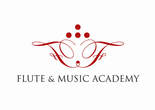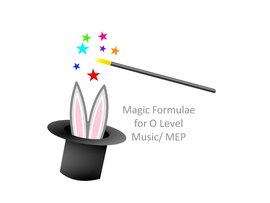Over a conversation with my good buddy recently, I just casually mentioned that for every O Level/ MEP student who comes to me for help always exit the first class with a certain twinkle in their eyes is as if they had just witnessed magic! He remarked immediately that I should write about my “magic formulae” of what I did in my first class!
Then I thought about it how can I present my “magic formulae” and I was stuck for a long time. The issue is, O Level Music/MEP is a subject that requires a variety of abilities and every student who comes to me has different problems. Hence, there’s no fix set of formulae for every student. However, after much thought, I decide I could discuss the most problematic segment in O Level Music: Music Writing or Wordsetting! After 15 years of teaching the O Level Music, I have figured out the “magic-formulae” and the 7-steps Framework which any student can use immediately! I am confident about this as it shows in my students’ results when I was the Subject Head in Dunman High: 80-96% distinctions were the norm, including my external students.
Interestingly, many schools I know do not conduct enough practice sessions for Wordsetting. Although it is only 20% of the current curriculum, the skills needed for this (unfortunately) requires regular practice. The spacing effect practice (phenomenon was first identified by Hermann Ebbinghaus), together with effective feedback, would be the best combination for any students to master the skills needed for Wordsetting.
Without further ado, here are my 10 “Magic Formulae” you need so one can do well in Wordsetting.
1. Be sure of the diction in English Language
With a multicultural society, the English diction has been rather tainted and this becomes a challenge for Wordsetting. Fortunately, most students are fine in this area as long as they are made aware of the diction and they can “switch” from Singlish to English accents. However, I have encountered a few students who have trouble differentiating the correct pronounciation. The Singlish diction has been ingrained in some students as the correct diction and that unfortunately needs to be rectified.
2.Able to understand the poem
Common sense it may seems but some students just dive into writing “formulae” harmonies and melodies after drafting the stress and rhythm. Do take time to analyse the poem’s mood, structure and note any words or phrases that is worth “painting musically” later. If you understand how the famous film music composer Hans Zimmer writes his film music, he ALWAYS discusses how long he takes to understand the movie or the character before even if he starts to pen anything down. It is important to understand WHAT you are writing for!
3. Able to write basic 4-part harmony & progressions, including Cadences
A good foundation of harmony goes a long way. Most schools have so little time that harmony is often covered very swiftly and some students often did not get to master the technique of harmony properly. For a decent Wordsetting to be accomplished fluently, I would recommend the completion of these two books to have sufficient vocabulary to create decent music: Roy Wilkinson’s ABC of Harmony Book A and Book B (Or anything equivalent).
4. Able to write effective melodies
Some students have excellent inner ear and are able to create beautiful melodies by intuition. I always remind these students that they must cherish this talent that they have and not take for granted. However, purely by intuition and not knowing why or how it sounds great is not good enough. There are certain things to note that will make the melody sounds better than others and knowing it ensures a much higher success rate. For students who are not gifted with the intuitive melodic line, good melody writing tips will certainly help.
5. Able to write some accompaniment patterns
I noticed this part of the training is the most overlooked. Do spend some time to learn writing some common accompaniment patterns per se first.
6. Know the piano and voice range
Interestingly, most students do have the correct knowledge about idiomatic piano writing and voice range. However, when it comes to the actual assignment, it takes a while to assimilate this understanding.
7. Learn from the masters by analyzing Songs and Lieder [composition devices, harmony, word painting etc…]
Seems like another common sense here but to my surprise over the years, most students tell me they have never looked at real literature for reference! There is so much to learn from real songs. Analysing with a teacher is also far more effective as the teacher is able to draw things out that a student is unable to “see”.
8. Know how to notate your composition properly, especially with the software
This part can be leant very quickly and do get it right!
9. Get effective feedback from a mentor who can point out the intricacies of music composition. Points 1 – 8 can still be figured out by oneself if one is smart enough. However, without step 9, all students are completely at a loss. What makes Wordsetting so difficult is that unlike other subjects, there is NO FIX ANSWER. A distinction piece of writing can come in all forms and character! I believe what makes the eyes twinkle after my class is that my students suddenly understood how to write their Wordsetting independently and confidently, using my 7-steps Wordsetting framework AND feedback.
10. Remember the spacing effect practice I mention at the start of this article? You need to write regularly and get feedback regularly, only then you can learn music writing EFFECTIVELY!
So there you go, that is my “magic formulae” for those who are struggling with Wordsetting! Do you still need help for your wordsetting after reading this? Contact me for a trial lesson via email: [email protected]
With much love,
Ms Lin Shumei
Then I thought about it how can I present my “magic formulae” and I was stuck for a long time. The issue is, O Level Music/MEP is a subject that requires a variety of abilities and every student who comes to me has different problems. Hence, there’s no fix set of formulae for every student. However, after much thought, I decide I could discuss the most problematic segment in O Level Music: Music Writing or Wordsetting! After 15 years of teaching the O Level Music, I have figured out the “magic-formulae” and the 7-steps Framework which any student can use immediately! I am confident about this as it shows in my students’ results when I was the Subject Head in Dunman High: 80-96% distinctions were the norm, including my external students.
Interestingly, many schools I know do not conduct enough practice sessions for Wordsetting. Although it is only 20% of the current curriculum, the skills needed for this (unfortunately) requires regular practice. The spacing effect practice (phenomenon was first identified by Hermann Ebbinghaus), together with effective feedback, would be the best combination for any students to master the skills needed for Wordsetting.
Without further ado, here are my 10 “Magic Formulae” you need so one can do well in Wordsetting.
1. Be sure of the diction in English Language
With a multicultural society, the English diction has been rather tainted and this becomes a challenge for Wordsetting. Fortunately, most students are fine in this area as long as they are made aware of the diction and they can “switch” from Singlish to English accents. However, I have encountered a few students who have trouble differentiating the correct pronounciation. The Singlish diction has been ingrained in some students as the correct diction and that unfortunately needs to be rectified.
2.Able to understand the poem
Common sense it may seems but some students just dive into writing “formulae” harmonies and melodies after drafting the stress and rhythm. Do take time to analyse the poem’s mood, structure and note any words or phrases that is worth “painting musically” later. If you understand how the famous film music composer Hans Zimmer writes his film music, he ALWAYS discusses how long he takes to understand the movie or the character before even if he starts to pen anything down. It is important to understand WHAT you are writing for!
3. Able to write basic 4-part harmony & progressions, including Cadences
A good foundation of harmony goes a long way. Most schools have so little time that harmony is often covered very swiftly and some students often did not get to master the technique of harmony properly. For a decent Wordsetting to be accomplished fluently, I would recommend the completion of these two books to have sufficient vocabulary to create decent music: Roy Wilkinson’s ABC of Harmony Book A and Book B (Or anything equivalent).
4. Able to write effective melodies
Some students have excellent inner ear and are able to create beautiful melodies by intuition. I always remind these students that they must cherish this talent that they have and not take for granted. However, purely by intuition and not knowing why or how it sounds great is not good enough. There are certain things to note that will make the melody sounds better than others and knowing it ensures a much higher success rate. For students who are not gifted with the intuitive melodic line, good melody writing tips will certainly help.
5. Able to write some accompaniment patterns
I noticed this part of the training is the most overlooked. Do spend some time to learn writing some common accompaniment patterns per se first.
6. Know the piano and voice range
Interestingly, most students do have the correct knowledge about idiomatic piano writing and voice range. However, when it comes to the actual assignment, it takes a while to assimilate this understanding.
7. Learn from the masters by analyzing Songs and Lieder [composition devices, harmony, word painting etc…]
Seems like another common sense here but to my surprise over the years, most students tell me they have never looked at real literature for reference! There is so much to learn from real songs. Analysing with a teacher is also far more effective as the teacher is able to draw things out that a student is unable to “see”.
8. Know how to notate your composition properly, especially with the software
This part can be leant very quickly and do get it right!
9. Get effective feedback from a mentor who can point out the intricacies of music composition. Points 1 – 8 can still be figured out by oneself if one is smart enough. However, without step 9, all students are completely at a loss. What makes Wordsetting so difficult is that unlike other subjects, there is NO FIX ANSWER. A distinction piece of writing can come in all forms and character! I believe what makes the eyes twinkle after my class is that my students suddenly understood how to write their Wordsetting independently and confidently, using my 7-steps Wordsetting framework AND feedback.
10. Remember the spacing effect practice I mention at the start of this article? You need to write regularly and get feedback regularly, only then you can learn music writing EFFECTIVELY!
So there you go, that is my “magic formulae” for those who are struggling with Wordsetting! Do you still need help for your wordsetting after reading this? Contact me for a trial lesson via email: [email protected]
With much love,
Ms Lin Shumei









